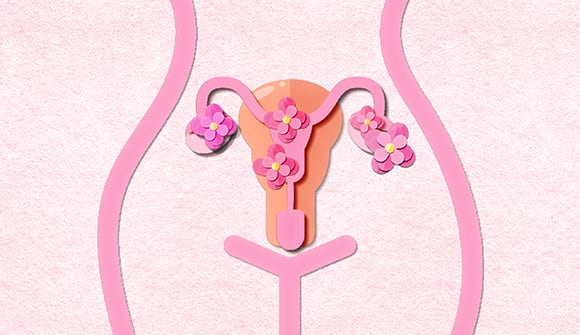Health tips for “unmentionable” areas
Navigating women's health throughout every stage of life.
Article Date:

Women experience changes in their bodies throughout their entire lives. Some of these changes are due to aging. Others are the result of hormonal changes related to menstrual cycles, pregnancy, postpartum or menopause. Patricia McFall Calhoun, MD, FAAFP, a family physician with Baptist Primary Care and longtime supporter of women’s health, explained that women’s hormone levels are more like the ocean than a placid lake.
“Our hormones can be calm and cyclic or stormy and unpredictable as we go through our many seasons of life,” Dr. Calhoun said.
Every woman is different, so it’s important to know what’s normal for you to recognize changes that may signal a possible health problem.
Gynecological symptoms you shouldn't ignore
While it may feel awkward to mention unusual symptoms in “unmentionable” places to your doctor, these changes often provide important clues to your health. If you notice any changes in your body, talk with your provider to make sure what you’re experiencing isn’t serious.
Pelvic or abdominal pain.
Only about 20% of pelvic pain women experience is actually due to gynecological problems, such as endometriosis or uterine fibroids. Musculoskeletal conditions and urinary or bowel problems can also cause pelvic pain.
Abnormal vaginal discharge.
All women have vaginal discharge; it’s nature’s way of keeping your genital area clean and healthy. Normal discharge is white or clear, with little or no odor.
“You should see your doctor if your vaginal discharge changes, takes on a noticeable odor, or you’re concerned about exposure to any sexually transmitted infections,” said Dr. Calhoun.
Breast changes.
Worrisome breast symptoms include a change in size or shape of the breast, skin changes on the breast, presence of a lump or changes in the nipple (including discharge). The symptoms of breast cancer and less serious breast problems are similar. In fact, only 20% of breast lumps are due to cancer, so don’t let fear of a cancer diagnosis keep you from discussing any breast changes with your doctor.
Dr. Calhoun added that beginning at age 40, women should be sure to schedule their annual mammogram.
Abnormal vaginal bleeding.
See your doctor if you experience heavy bleeding that lasts longer than normal or occurs more frequently than every three weeks, after sex or between periods.
“You should also follow up with your physician if you develop any postmenopausal bleeding, as this could be a warning sign for pre-cancer or cancer of the uterus,” Dr. Calhoun added.
Pain during sexual intercourse.
Don’t be embarrassed. According to the American College of Obstetrics and Gynecology, nearly three-quarters of women will experience pain during sex at some point in their lives, particularly after menopause.
Changes during menopause
Menopause is the natural end to a woman’s childbearing years and is diagnosed after 12 months without a menstrual period.
“Defining menopause can sometimes become a little complicated for women on birth control pills, with an intrauterine device (IUD), or who have undergone an endometrial ablation, which is a procedure used to treat heavy menstrual cycles,” Dr. Calhoun said. “Be sure to talk to your doctor to help you understand these specific perimenopausal [transition to menopause] circumstances.”
For some women, this transition is uneventful. However, up to 40% of women experience one or more disruptive symptoms, including:
- Vaginal burning or itching
- Decreased libido
- Painful intercourse
- Bleeding after sex
- More frequent vaginal or urinary tract infections
- Frequent urination
If you are a pre or postmenopausal woman and are uncomfortable due to the changes in your body, talk to your doctor. There are many healthy ways to address symptoms.
“A minority of women, about 5% to 10%, will continue to experience some menopause symptoms indefinitely,” said Dr. Calhoun. “You should absolutely see your doctor if you have any postmenopausal vaginal bleeding once your periods have stopped for over a year, or if you develop heavy perimenopausal bleeding.”
Gynecological cancer screening
Health experts agree that women should undergo regular screenings for cervical cancer. If you’re at increased risk (for example, you have a family history of cancer), your doctor may recommend earlier or more frequent screening. The goal is to find cancer early, when treatment is most effective.
“Women should undergo Pap tests for cervical cancer screening between the ages of 21 and 65 or between 30 and 65 in combination with human papillomavirus (HPV) testing,” Dr. Calhoun explained. “Prior to age 21, urine sexually transmitted disease (STD) testing is recommended for young women who are sexually active”.
Ask your doctor about the right screening test and frequency for you. Currently, there is no reliable screening for endometrial or ovarian cancer. However, Dr. Calhoun noted that much research is underway to develop future cancer screening with simple blood tests.
If you experience postmenopausal bleeding, unexplained bloating, pelvic or abdominal pain, difficulty eating, urinary changes (urgency, frequency or pain), or you find you feel full quickly after eating, see your doctor to rule out endometrial or ovarian cancer.
Pelvic Health 101
Some of the symptoms women experience are related to a weakened pelvic floor.
“While childbirth can give us an amazing new family addition, long-term effects may cause pelvic concerns,” said Dr. Calhoun.
Baptist Health offers a program called Total Control®, an evidence-based program and a no-medication, nonsurgical way to improve pelvic health. It helps women strengthen the “pelvic pyramid,” which includes the pelvic floor muscles, lower back muscles and abdominal muscles.
The most important takeaway is to learn what's normal for YOU, so you can recognize new or unusual symptoms and visit your doctor with any concerns. Make sure you keep track of any recommended screenings and annual visits.
Baptist Health offers a collection of wellness services focused on women.
We are committed to providing you with quality care through every stage of your life. Learn more at baptistjax.com/4her.



